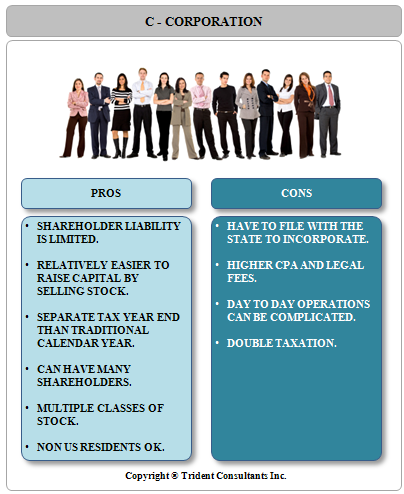Home Starting a Business Free Incorporation Guide - Corporation (C-Corp)
Free Incorporation Guide - Corporation (C-Corp)
The choice of entity and business structure that determines how you as a business owner will conduct your business is very important. There are many options available to the business owner who is looking to begin a new business enterprise or even to someone who is buying an existing business. Keep in mind that the laws and rules governing the different types of entities vary from State to State. Before making this choice we highly recommend that you consult with a CPA (certified Public Accountant) and a qualified attorney. There are many significant implications in the selection of business entity under which you will operate the information presented in this section is only to give the reader a general idea of the type of entities that are available.
The main types of business entities that you can operate under are:
- Sole Proprietor
- General Partnership
- Limited Partnership
- Limited Liability Partnership
- S-corporation
- C-corporation
- Limited Liability Company
6. C-Corporation

A regular corporation or C-corporation is a very popular business entity. It is a separate legal entity that comes into existence when you file the appropriate forms with the State. A C-corporation is also a separate entity from the point of view of taxation – it earns income in its own name and pays taxes on its own name. The owners of the corporation are called shareholders and the day to day working of a corporation is typically conducted management that is selected by a board of directors – corporations do not have to have a board of directors but most of them do. In the small business world, a C-corporation may be a closely held company with only one or a few shareholders.
Other obvious advantages of a having a C-corporation entity is the ability to select a different accounting year end then the calendar year; the limitation of personal liability of the shareholders and the ease with which shares can be transferred. It is important to note that a C-corporation can also have different classes of stock – some with voting rights that can affect the operations of the C-corporation and some without voting rights. Further C-corporations can be owned by other C-corporations, S-corporations, limited liability companies, partnerships and trusts.
Disadvantages of a C-corporation is that filing fees have to be paid to the State every year and taxes have to be filed separately for the company different from the taxes filed by its shareholders – dividends distributed to the shareholders are taxed again leading to double taxation. Also with the requirements of directors, annual meetings and annual reporting running a C-corporation can be complicated and more expensive than a general partnership or sole proprietorship.
Small Business Owner Resource Center

Articles on the Small Business Financing Sources, the Small Business Loan Basics, small business loans Checklist and SBA Loans are incredible sources of knowledge for the small business owner.

Credit Report and Credit Score Analysis, how to Read a Personal Credit Report and all about Business Credit cover the intricacies of credit and are required reading for everybody.

The Foundation Grant Directory is a free listing of sources for grants by state. Why not look if there is some free money out there for your business. Hey - you never know!

The Business Loan Application covers every item you will need in your loan package and tells you how to get approved for business loans.

Fire your loan broker and use our Free Business Loans Bank / Lender Directory to find every bank in the country lending to small businesses.

If you are looking to start a business - look no further. Check out the Free Incorporation Guide discussion and the State Incorporation Resource Directory.
